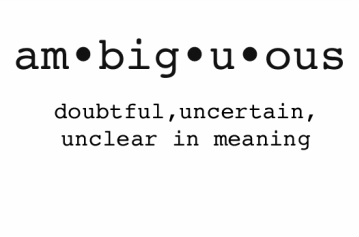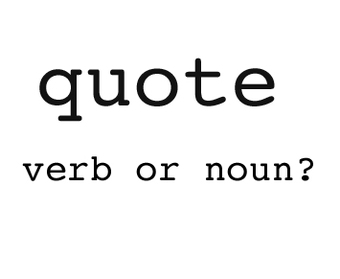
Attorney Perry Mason always got his man (or woman) in classic TV episodes like The Case of the Terrified Typist and The Case of the Poisoned Pen. Today's grammar installment doesn't involve murder but considers the mayhem wrought when writers are careless with antecedents and pronouns. Today we're going to study The Case of the Ambiguous Antecedent.
Ante what?
An antecedent is a word, phrase or clause that has a substitute, or stand-in, elsewhere in the sentence. In simplest terms, an antecedent is a noun that has a pronoun stand-in elsewhere in the sentence. Let's look at an example:
Jane couldn't start the car because she didn't have the keys.
In this example, Jane is the antecedent; she is the pronoun that stands in for Jane later in the sentence. It's pretty easy to see how this noun and pronoun relate to each other. Take another example, though, where the connection isn't so clear:
I took the dog for a walk and then drove to the library to pick up a book before it closed at noon.
This example shows how ambiguity can result when it an antecedent becomes separated from its pronoun. The way this sentence is constructed, it sounds as if the book will close at noon — not the library. An easy rewrite would be:
I took the dog for a walk and then went to pick up a book at the library before it closed at noon.
Readers expect the noun antecedent and its pronoun stand-in to be relatively close together. With shorter sentences (like the example of the car keys), it's pretty easy to keep antecedents and the words they refer to in close proximity. With longer, more complex sentences, an antecedent and its pronoun can soon become separated, leaving the reader to wonder what the writer really meant to say.
Antecedent first, pronoun second
Writers should also consider the order in which an antecedent and its pronoun appear within a sentence. The prefix ante in antecedent means "prior to" or "earlier than." In proper construction, the antecedent appears before its pronoun stand-in. Look at these examples.
#1: Even though she was excited about the trip, Ellen dreaded going through security.
#2: Even though Ellen was excited about the trip, she dreaded going through security.
In the first sentence, the pronoun comes before its antecedent. This can sometimes cause confusion. While I won't say you can never place the pronoun first, I will say that in most cases it is probably better to avoid the practice.
Avoid ambiguity
Ambiguous antecedents interrupt the flow of your prose and cause confusion for the reader. Of course no one is going to believe a book is closing at noon, but this type of writing will cause your reader to stop, stumble and re-read a sentence. You don't want that. If you make the reader work too hard, they may become frustrated and find reading enjoyment elsewhere.
The next time you're putting the polish on your prose, take care to notice the placement of pronouns and their antecedents. When necessary, a quick rewrite will result in clean copy that readers can easily follow.
Do you struggle with ambiguous antecedents? Do you have examples that illustrate this problem? Please share them in the Comments. If you have a writing, grammar or language question, please share it here for consideration on this blog.
Ante what?
An antecedent is a word, phrase or clause that has a substitute, or stand-in, elsewhere in the sentence. In simplest terms, an antecedent is a noun that has a pronoun stand-in elsewhere in the sentence. Let's look at an example:
Jane couldn't start the car because she didn't have the keys.
In this example, Jane is the antecedent; she is the pronoun that stands in for Jane later in the sentence. It's pretty easy to see how this noun and pronoun relate to each other. Take another example, though, where the connection isn't so clear:
I took the dog for a walk and then drove to the library to pick up a book before it closed at noon.
This example shows how ambiguity can result when it an antecedent becomes separated from its pronoun. The way this sentence is constructed, it sounds as if the book will close at noon — not the library. An easy rewrite would be:
I took the dog for a walk and then went to pick up a book at the library before it closed at noon.
Readers expect the noun antecedent and its pronoun stand-in to be relatively close together. With shorter sentences (like the example of the car keys), it's pretty easy to keep antecedents and the words they refer to in close proximity. With longer, more complex sentences, an antecedent and its pronoun can soon become separated, leaving the reader to wonder what the writer really meant to say.
Antecedent first, pronoun second
Writers should also consider the order in which an antecedent and its pronoun appear within a sentence. The prefix ante in antecedent means "prior to" or "earlier than." In proper construction, the antecedent appears before its pronoun stand-in. Look at these examples.
#1: Even though she was excited about the trip, Ellen dreaded going through security.
#2: Even though Ellen was excited about the trip, she dreaded going through security.
In the first sentence, the pronoun comes before its antecedent. This can sometimes cause confusion. While I won't say you can never place the pronoun first, I will say that in most cases it is probably better to avoid the practice.
Avoid ambiguity
Ambiguous antecedents interrupt the flow of your prose and cause confusion for the reader. Of course no one is going to believe a book is closing at noon, but this type of writing will cause your reader to stop, stumble and re-read a sentence. You don't want that. If you make the reader work too hard, they may become frustrated and find reading enjoyment elsewhere.
The next time you're putting the polish on your prose, take care to notice the placement of pronouns and their antecedents. When necessary, a quick rewrite will result in clean copy that readers can easily follow.
Do you struggle with ambiguous antecedents? Do you have examples that illustrate this problem? Please share them in the Comments. If you have a writing, grammar or language question, please share it here for consideration on this blog.


